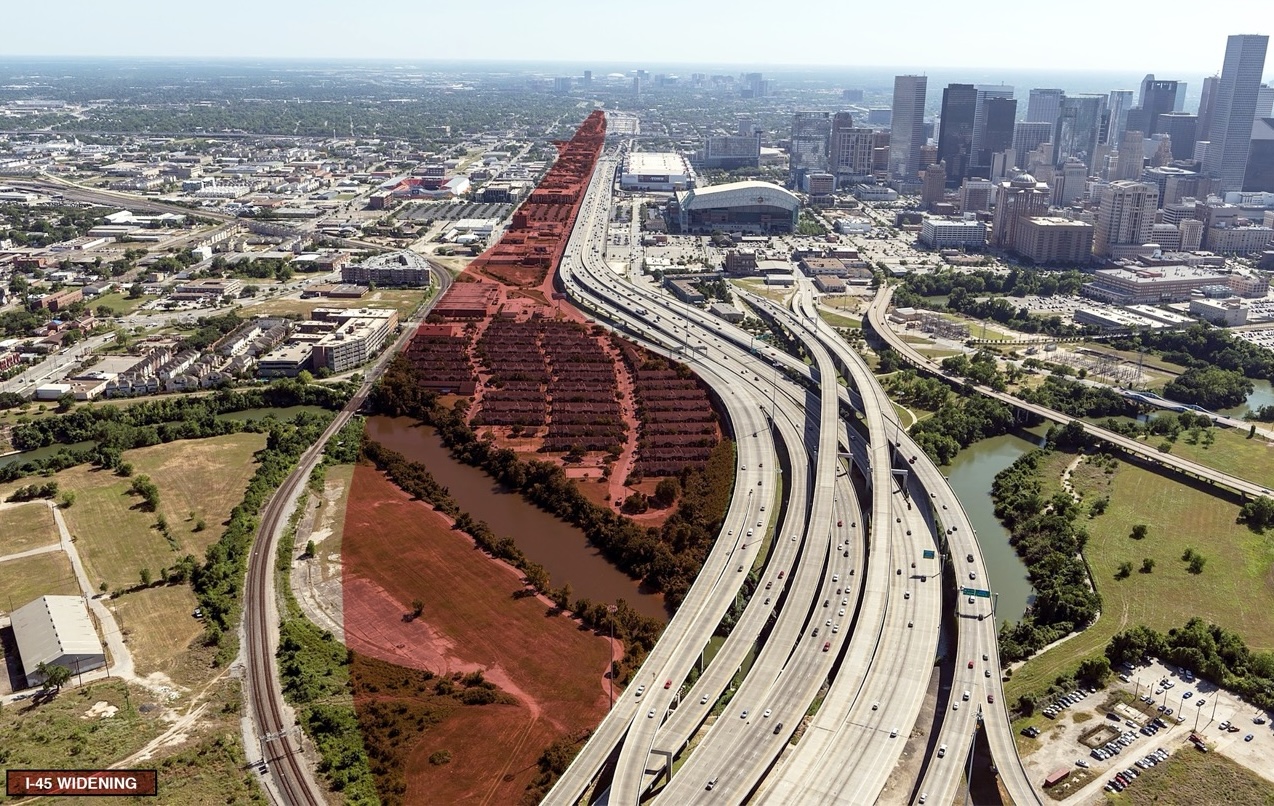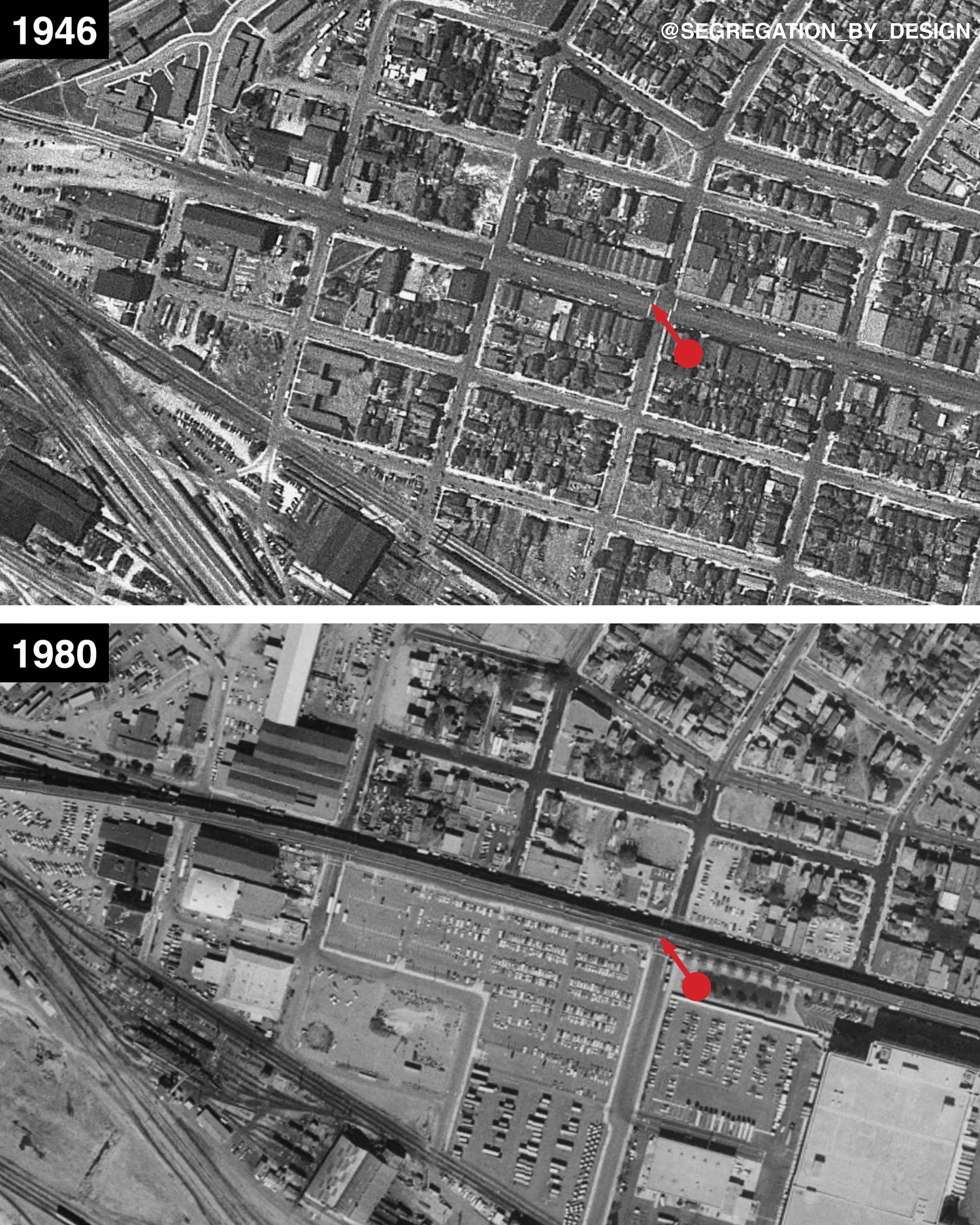[ad_1]
This story was initially revealed by Capital B.
Practically 45 years in the past, the Acres Properties space north of Houston was the biggest unincorporated Black group within the South, a thriving 9-square mile space the place homeownership was the norm. That was till the town of Houston annexed it, and the Interstate 45 freeway was constructed by way of its coronary heart.
Within the aftermath, the group’s poverty fee has jumped to nearly double the town’s common, and well being illnesses from air pollution have elevated.
President Joe Biden’s bipartisan infrastructure regulation, one of many nation’s most vital investments in curbing local weather change, was supposed to contemplate the historical past of areas like Acres Properties in an try and make communities complete once more.
By making a pathway to constructing the clear power economic system, from increasing electrical college bus fleets to subways and mass transit choices, it might additionally function a solution to reverse the well-documented historical past of how the nation’s highways ripped aside Black communities. As residents have been displaced, homeownership possibilities have been stunted, and Black folks have been left overexposed to air pollution from vehicles and vans and have become almost certainly to die in automobile crashes.
As a substitute, the regulation is definitely rising air pollution and contributing to the continued disruption and displacement of Black communities, based on a brand new report by the local weather coverage group Transportation for America.
In response to the brand new report, what has primarily occurred is a repeat of that historical past: freeways, highways, and extra roads. Out of the greater than 55,000 initiatives totaling roughly $130 billion carried out by way of the $1.2 trillion spending bundle, almost half of the spending has been allotted to freeway enlargement.

Adam Paul Susaneck and Segregation by Design
Nonetheless, lower than three weeks following the report’s launch, the Biden administration introduced a $3.3 billion spending plan to “reconnect and rebuild communities” in additional than 40 states disconnected by highways all through the twentieth century. Among the spending’s most outstanding focuses embrace Milwaukee, Atlanta, and Los Angeles, the place public transit choices will improve and a few highways will probably be capped.
Nonetheless, the spending pales compared to latest allocations to increase freeways.
Final 12 months, the Biden administration supported an almost $10 billion enlargement of that very same freeway that tore by way of Acres Properties. The enlargement led to the demolition of virtually 1,000 properties in a majority Black and Latino group.
It’s a mistake we’ve seen time and time once more on this nation, mentioned Cherrelle J. Duncan, director of group engagement at LINK Houston, a coverage group centered on bettering transit choices in Houston’s Black and brown communities.
“Highways and increasing them don’t make your communities simpler or reduce site visitors. It doesn’t make your vehicles transfer quicker,” she defined. “All it does is improve our air air pollution, our noise air pollution, and it additionally simply terribly impacts Black communities and brown communities by pulling assets, and in addition making them fairly actually bypass and drive proper previous our communities.”
A research by Air Alliance Houston, a nonprofit environmental justice group, discovered that ranges of benzene, a carcinogen, will greater than double at some faculties alongside the expanded freeway.
Nationwide, the freeway funding will virtually wipe out any constructive local weather advantages from different spending priorities. The easy outcome, the report discovered, is that the U.S. will generate extra emissions from transportation, already its largest supply of planet-heating gases, than if the invoice hadn’t ever handed. By 2040, the air pollution created from these initiatives will probably be equal to working 48 coal-fired energy crops a 12 months.
The spending up to now has created a “local weather time bomb” that will even perpetuate the displacement of Black communities, the report concluded.
It’s even identified to exacerbate local weather considerations, like in Elba, Alabama, the place Capital B reported on how a brand new freeway enlargement intensified a flooding disaster in a rural Black group, resulting in fears that residents can be flooded out of their properties and displaced.
Final month, a coalition of 200 local weather organizations referred to as for a nationwide moratorium on freeway expansions, notably because of the hurt they’ve triggered in Black and brown communities.
“We’re seeing how infrastructure actually tears us aside,” Duncan mentioned. “We’ve created a division between communities in order that we’re now not capable of work together with one another whereas making it tougher to construct local weather resilience, to cease floods, or flee in instances of catastrophe.”
Why does this maintain occurring?
Whereas the Division of Transportation beneath the Biden administration really helpful that states prioritize repairing roads over increasing them and urged states to contemplate the affect on communities of coloration reeling from a long time of division by highways, the spending invoice granted states appreciable discretion in allocating funds.
As with lots of Biden’s insurance policies, it prompted a backlash from Republicans in Congress and was principally neglected by states reminiscent of Texas and even California, which obtained probably the most funds by way of the spending invoice. On the similar time, there was little curiosity in bettering entry to public transit, which has taken a success nationwide after the pandemic lowered commuter income.

In Houston, Duncan has seen firsthand how the nation’s renewed funding in highways over different transit choices is disrupting a brand new era of Black kids.
“You probably have car-centric infrastructure,” Duncan mentioned, “you’re merely going to have considerably worse air air pollution, going to have extra automobile crashes, and it’s all going to be centered in Black communities.”
As Capital B reported final 12 months, Black individuals are nearly twice as seemingly as white folks to die in automobile crashes.
The battle to reconnect communities
There have been makes an attempt nationwide to reconnect Black communities disrupted by freeways. In Detroit, for instance, the place a vibrant Black group was destroyed for a freeway within the Nineteen Fifties, there’s a plan to eradicate the freeway. The Biden administration has allotted $105 million to the venture.
Nonetheless, the plan is to exchange the freeway with a avenue that’s six lanes extensive and divided by a median for many of its size. Transit advocates say the present design is nonetheless too centered on the considerations of drivers.
This pathway of “boulevardization” in communities disturbed by highways has been the primary tactic carried out by cities throughout the nation. This method includes eradicating freeway constructions fully and changing them with city boulevards, however as within the case of Detroit, it may well nonetheless prioritize vehicles reasonably than metropolis residents. In some circumstances, it has even led to gentrifying and displacing the very communities it goals to help.

ourtesy of Adam Paul Susaneck and Segregation by Design
One of many earliest examples of boulevardization, which happened in Oakland, California, within the early Nineteen Nineties and has been used as a major instance of the method’s success, truly led to the neighborhood’s Black inhabitants dropping by a 3rd because the median family earnings elevated by 55 p.c between 1990 and 2010.
It’s an ideal instance of intention by no means being actualized as a result of Black communities aren’t being listened to, Duncan mentioned.
“It’s critically necessary for each company and metropolis group to contain numerous voices with regards to planning transportation,” Duncan mentioned. “If you will actively rip aside our communities and actively separate them by highways, the least that you are able to do is actually hear and interact them to make sure that these venture fixes and insurance policies don’t overlook us once more.”
Over the previous 12 months, Duncan’s group has labored to gather group enter for related freeway elimination makes an attempt and requires funding in walkability and public transit; she hopes leaders will hear.
[ad_2]
Source link



